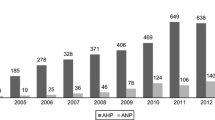Abstract
For encouraging communication in a group decision making, this paper proposes methods to aggregate individual preferences. The individual preferences are denoted as the interval priority weights of alternatives by Interval Analytic Hierarchy Process (Interval AHP). It is proposed to handle subjective judgments since the induced results are intervals reflecting uncertainty of given information. When each decision maker gives the judgments on alternatives, the priority weights of alternatives are obtained. In the sense of reducing communication barriers, such information helps group members to realize their own preferences and the others’ opinions. Then, they are aggregated based on the concept of the interval regression analysis with interval output data, where two inclusion relations between the estimations and the observations are assumed. From the possibility view, the least upper approximation model is determined so as to include all observations. While, from the necessity view, the greatest lower approximation model is determined so as to be included in all observations. The former possible aggregations are acceptable for each group member and the latter necessary ones are useful for the supervisor at the upper level of decision making.
Access this chapter
Tax calculation will be finalised at checkout
Purchases are for personal use only
Preview
Unable to display preview. Download preview PDF.
Similar content being viewed by others
References
Saaty, T.L.: The Analytic Hierarchy Process. McGraw-Hill, New York (1980)
Forman, E., Peniwati, K.: Aggregating individual judgments and priorities with the Analytic Hierarchy Process. European Journal of Operational Research 108, 165–169 (1998)
Dyer, R.F., Forman, E.H.: Group decision support with the Analytic Hierarchy Process. Decision Support Systems 8, 94–124 (1992)
Escobarm, M.T., Aguaron, J., Moreno-Jimenez, J.M.: A note on AHP group consistency for the row geometric mean priorization procedure. European Journal of Operational Research 153, 318–322 (2004)
Saaty, T.L.: Group decision making and the AHP. In: Golden, B.L., et al. (eds.) The Analytic Hierarchy Process: Applications and Studies, pp. 59–67. McGraw-Hill, New York (1989)
Desanctis, G., Gallupe, R.B.: A foundation for the study of group decision support systems. Management Science 33, 589–609 (1987)
Salo, A.A.: Interactive decision aiding for group decision support. European Journal of Operational Research 84, 134–149 (1994)
Sugihara, K., Tanaka, H.: Interval evaluations in the Analytic Hierarchy Process by possibilistic analysis. Computational Intelligence 17, 567–579 (2001)
Sugihara, K., Ishii, H., Tanaka, H.: Interval priorities in AHP by interval regression analysis. European Journal of Operational Research 158, 745–754 (2004)
Tanaka, H., Guo, P.: Possibilistic Data Analysis for Operations Research. Springer, Heidelberg (1999)
de Campos, L.M., Huete, J.F., Moral, S.: Probability intervals: a tool for uncertain reasoning. International Journal of Uncertainty 2, 167–196 (1994)
Tanaka, H., Sugihara, K., Maeda, Y.: Non-additive measures by interval probability functions. Information Sciences 164, 209–227 (2004)
Tanaka, H., Entani, T.: Properties of evidences based on interval probabilities obtained by pairwise comparisons in AHP. In: Proceedings of Taiwan-Japan Symposium on Fuzzy Systems and Innovational Computing, pp. 35–40 (2006)
Entani, T., Tanaka, H.: Management of ignorance by interval probabilities. In: Proceedings of 2007 IEEE International Conference on Fuzzy Systems, pp. 841–846 (2007)
Brazilia, J., Golany, B.: AHP rank reversal, normalization and aggregation rules. Information Systems and Operational Research 32, 14–20 (1994)
Ramanathan, R., Ganesh, L.S.: Group reference aggregation methods in AHP: An evaluation and an intrinsic process for deriving members’ weightages. European Journal of Operational Research 79, 249–268 (1994)
Entani, T.: Interval AHP for a group of decision makers. In: Proceedings of IFSA/EUSFLAT 2009, pp. 155–160 (2009)
Author information
Authors and Affiliations
Editor information
Editors and Affiliations
Rights and permissions
Copyright information
© 2010 Springer-Verlag Berlin Heidelberg
About this chapter
Cite this chapter
Entani, T., Inuiguchi, M. (2010). Group Decisions in Interval AHP Based on Interval Regression Analysis. In: Huynh, VN., Nakamori, Y., Lawry, J., Inuiguchi, M. (eds) Integrated Uncertainty Management and Applications. Advances in Intelligent and Soft Computing, vol 68. Springer, Berlin, Heidelberg. https://doi.org/10.1007/978-3-642-11960-6_25
Download citation
DOI: https://doi.org/10.1007/978-3-642-11960-6_25
Publisher Name: Springer, Berlin, Heidelberg
Print ISBN: 978-3-642-11959-0
Online ISBN: 978-3-642-11960-6
eBook Packages: EngineeringEngineering (R0)




